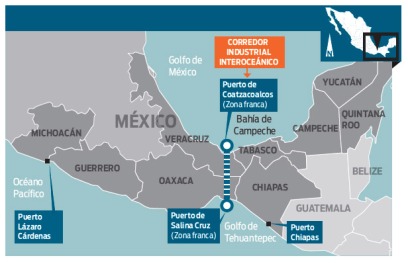Location of Special Economic Zones (SEZs). Image: @Dinero en Imagen
On 14 December the Chamber of Deputies approved the initiative to legalize Special Economic Zones (SEZ) which had been presented to the federal Congress in September of this year. These SEZs will be regions in which investors face financial benefits, particularly in terms of “flexible labor.” In this sense, the SEZs serve foreign economic interests and would institute a special customs regime, all of this toward the end, as the government claims, of promoting development in southern Mexico by means of attracting foreign investment.
In accordance with information from the president’s office, there are plans to build infrastructure projects using an initial investment of nearly 115 billion pesos, including new gaseoducts, railroads, highways, ports, and airports. According to Chiapas Paralelo, this investment would come from public coffers but is “designed for by by private capital, in a mercantile logic […] whereby the people of Chiapas is present only as labor, leaving to the side the question of who owns the natural resources.” In this way, the projects are expected to create 115,000 jobs over the next 10 years, though analysts indicate that it will attract specialists from elsewhere in the country, leaving the most precarious jobs for locals.
The planned SEZs include the “Lázaro Cárdenas” port, incorporating municipalities straddling Michoacán and Guerrero toward the end of exploitation; the “Interoceanic Corridor of Tehuantepec,” which will affect Coatzacoalcos, Veracruz, Salina Cruz, and Oaxaca, and will permit commercial transit between the Pacific Ocean and the Gulf of Mexico; and lastly, the “Chiapas Port” which would facilitate exports to Asia. The permits to construct and administer a zone can be granted for up to 40 years.
It bears mentioning that organizations like the Indigenous and Campesino Front of Mexico (FICAM) have expressed their rejection of the SEZ initiative, given that “it is a new embestida against the peoples and communities of this country” which “seeks to legalize the plundering of lands of the people” and that “it is the complement to the energy reform, which aimed at reassuring transnational firms juridically.”
FICAM members opined that the SEZs will worsen levels of social marginalization, only “make the rich richer,” and will take advantage of cheap labor in these zones, precisely among those which experience the highest levels of poverty in the country. Lastly, they shared that “the proposal for the [SEZs] instead of being accompanied by public policies to transform the country, but only represents the presentation of the wealth of the country to grand capital on a silver platter.”
For more information (in Spanish):
Diputados aprueban ‘zonas económicas especiales’ en México (Aristegui Noticias, 14 de diciembre de 2015)
Aprueban diputados ley para crear Zonas de “Explotación” Especial (EDUCA, 15 de diciembre de 2015)
Prevé expropiar terrenos el plan de zonas económicas especiales (La Jornada, 1 de octubre de 2015)
Zonas Económicas Especiales, una iniciativa para el despojo (Chiapas Paralelo, 30 de septiembre de 2015)
Zonas Económicas de EPN legalizarán despojo de tierras; complementan la energética para dar certeza a empresas: FICAM (Revolución Tres Punto Cero, 17 de octubre de 2015)
México en el giro de tuerca mundial: Zonas Económicas Especiales (Parte I) (Subversiones, 20 de noviembre de 2015)
Otro eslabón para el despojo (La Jornada, 6 de octubre de 2015)
For more information from SIPAZ (in English):
Chiapas: Mining reactivation is denounced in the state (3 March 2015)
Chiapas: popular rejection of dams and mining projects in the Tapachula, Motozintla, Huixtla, and Huehuetán region (December 17, 2014)
